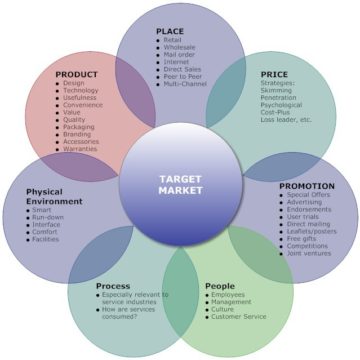The four P’s of marketing are Product, Price, Promotion, and Place. This model of the marketing mix was documented in 1960 in the text book Basic Marketing: A Managerial Approach by co-author E. Jerome McCarthy, a marketing professor at Michigan State University, revising previous models down to the following four simple points.
Product (or Service), Price, Place (i.e. distribution), Promotion
Product – the item/service that satisfies a customer/user demand and all its features and benefits
Price – what
customer/user exchanges for the product – setting or changing price is part of overall business and marketing strategy; for nonprofits this might include a membership fee, prices on items sold for fundraising, the time or resources given up in exchange for a service, the action requested by a cause, the other ‘costs’ for using a service or attending an event (e.g. hard to get transportation to the library or an event, so ‘cost’ too high to attend)
Place – how and where the user/customer gets the product; marketing via changes in Place might include adding a new location, increasing hours, adding a kiosk at seasonal location, taking services to community, live-streaming an in-person event or changing your website, adding a donation button online
Promotion – the methods (channels) of communication to a user/customer about the product and its price and place (i.e. tactics; advertising, public relations, sales, sales promotions, etc)
Some marketing experts and teachers have expanded this to more Ps and to cover services and service-based organizations: Physical evidence (that service was performed or delivered), People (the employees delivering the service and way they do so), Process (systems that affect delivering service)

Search or explore below to find answers to some of the most commons questions in digital marketing.
Results for {phrase} ({results_count} of {results_count_total})
Displaying {results_count} results of {results_count_total}